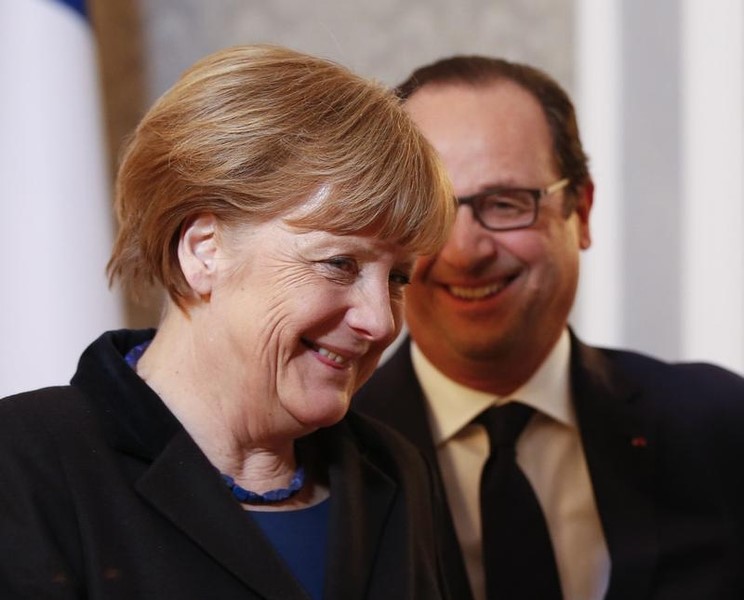By Stephen Brown
BERLIN (Reuters) - Kiev, Moscow, Munich, Washington, Ottawa, Minsk and Brussels -- all in a week's work for Angela Merkel, whose tireless efforts to broker peace in Ukraine and keep Greece in the euro zone won praise even from the chancellor's fiercest critics in Germany.
"I don't feel bad. And the week isn't even over. Tomorrow is a working day," Merkel said late on Thursday after negotiating for 16 hours to wrestle a ceasefire deal from Russia's Vladimir Putin before flying straight to Brussels to deal with the Greeks.
Beneath a photo of the haggard 60-year-old chancellor at the end of the Ukraine talks, top-selling German daily Bild enthused that in Minsk and Brussels "she did in two days what for others is a week's work".
But Merkel herself is cautious about what had actually been achieved and fighting erupted in Ukraine on Friday as the agreed ceasefire approached.
Asked how Merkel manages what conservative daily Die Welt called an "unbelievable marathon", one aide said she simply has stamina and concentration -- and drinks lots of water.
Merkel once told a women's magazine that she stores up sleep "like a camel".
"There's no secret. She doesn't have a fitness programme or do yoga or anything. She just has robust health," said the aide. "And she's able to get by without sleep."
Merkel's standing as Europe's pre-eminent stateswoman looks unassailable, with France's Francois Hollande playing a solid supporting role and Britain's David Cameron sidelined in the Ukraine crisis and irrelevant, as a euro outsider, on Greece.
"Europe speaks Merkel," said Bild, barely concealing its adulation for her efforts to convince U.S. President Barack Obama to fend off requests to send arms to Kiev and Greece's Alexis Tsipras not to burn bridges with Brussels.
MARATHON WOMAN
Austria's Die Presse said "nothing works in Europe without Merkel", adding: "Who else could have got Russia's President Vladimir Putin back to the negotiating table?"
Even the hardline German Left party's acerbic parliamentary leader Gregor Gysi felt obliged to tip his hat to Merkel and Hollande's efforts, saying they "deserve recognition" for the deal in Belarus, whose president, Alexander Lukashenko, gushed about the chancellor's "dazzling" Russian-language skills.
Merkel herself, whose down-to-earth style is popular across the political spectrum, cautioned that the deal between Putin and Ukraine's Petro Poroshenko offers only a "glimmer of hope".
She has kept lines open to Putin through the Ukraine crisis, but her initial reluctance to impose sanctions vanished when it became clear to her that he was sending weapons and troops to the rebels.
"The praise for the chancellor's initiative with Hollande in Moscow and Kiev is deserved but there could still be setbacks so it would be wrong to say the problem has been solved," said one German government source, speaking on condition of anonymity.
Foreign policy experts agreed.
"It is much too early to praise Merkel to the skies for her peace politics initiative," said Thomas Risse at Berlin's Free University, adding that she had no influence over whether the ceasefire beginning on Sunday actually holds.
Her hectic schedule continues next week, with visits to Pope Francis in the Vatican and Hollande in Paris. But Merkel reminded reporters it was not all about geopolitics and there were "also domestic issues to deal with. Nothing so dramatic, but we have to deal with them too".

Back in Berlin, she has scheduled talks about tax with her equally Stakhanovite Finance Minister Wolfgang Schaeuble for Saturday and aides said she will follow a local election in Hamburg on Sunday night -- possibly after a lie-in on Sunday morning.